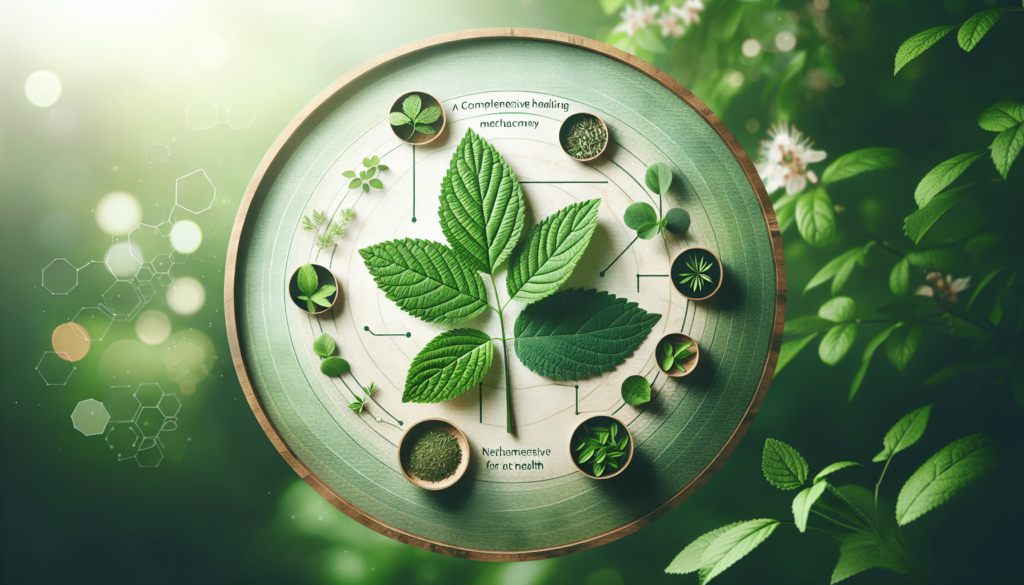If you’ve ever wondered about the potential healing powers of herbs when it comes to the gut lining, you’re not alone. With the rise in digestive issues and a greater focus on overall gut health, many people are seeking natural remedies to support and repair their intestinal lining. In this article, we’ll explore whether any herbs have been found to aid in the repair of the gut lining and discuss their potential benefits. So, if you’re curious to learn about the possible herbal allies for your gut health, read on!

Introduction
When it comes to maintaining a healthy gut, the lining of your intestines plays a crucial role. The gut lining, also known as the intestinal barrier, serves as a protective barrier between the contents of your intestines and the rest of your body. In order to function optimally, it is important for the gut lining to be strong and intact. However, various factors can damage the gut lining and compromise its function. Fortunately, there are several herbs that can help support gut health and promote the repair of the gut lining.
Understanding the Gut Lining
What is the gut lining?
The gut lining refers to the mucous membrane that lines the entire length of your intestines, from the stomach to the rectum. It consists of a single layer of specialized cells that are tightly packed together, forming a barrier that prevents harmful substances or bacteria from entering your bloodstream.
Functions of the gut lining
The gut lining serves multiple functions in the body. It not only acts as a barrier, but also helps with the absorption of nutrients from the food you consume. Additionally, it houses a large number of immune cells that play a vital role in defending against pathogens and maintaining overall immune health.
Causes of gut lining damage
Several factors can contribute to the damage of the gut lining. Poor diet, stress, infections, chronic inflammation, certain medications, and food sensitivities or allergies are just a few examples. When the gut lining is compromised, it can lead to a condition known as increased intestinal permeability, or “leaky gut,” which allows undigested food particles, toxins, and bacteria to leak into the bloodstream.
Herbs for Gut Health
When it comes to promoting gut health and repairing the gut lining, a number of herbs have been found to be beneficial. Let’s explore some of these herbs and discover how they can support your digestive system.
Turmeric
Turmeric, a vibrant yellow spice often used in cooking, has been recognized for its numerous health benefits, including its ability to support gut health. Curcumin, the active compound in turmeric, has potent anti-inflammatory properties that can help reduce gut inflammation and support the repair of the gut lining.
Marshmallow Root
Don’t be fooled by the name, marshmallow root is not the fluffy confection we are accustomed to. It is actually a medicinal herb that has been traditionally used to soothe and protect the gut lining. Marshmallow root contains mucilage, a gel-like substance that coats the lining of the intestines, providing a protective barrier and helping to reduce inflammation.
Slippery Elm
Similar to marshmallow root, slippery elm is known for its soothing properties on the gut lining. It contains a high concentration of mucilage, which forms a protective layer over the gut lining. This protective layer helps reduce inflammation and supports the healing of the gut lining.
Licorice Root
Licorice root has been used for centuries for its medicinal properties, including its ability to support gut health. It contains compounds that have been found to possess anti-inflammatory properties, which can help reduce gut inflammation. Additionally, licorice root supports the repair of the gut lining and provides protection for the stomach lining.
Ginger
Ginger is a well-known herb that is often used to alleviate digestive discomfort. It has been shown to have anti-inflammatory effects on the gut and can help reduce inflammation. Ginger also supports digestion by stimulating the production of digestive enzymes, which aids in the breakdown of food.
Aloe Vera
Aloe vera is not only beneficial for soothing sunburns, but it can also be beneficial for the gut lining. It has been used for centuries for its healing properties and can help reduce inflammation in the gut. Aloe vera also promotes the healing of the gut lining, making it an excellent herb for gut health.
Chamomile
Chamomile is commonly known for its calming properties, but it can also be beneficial for the gut lining. It possesses anti-inflammatory properties that help reduce gut inflammation. Chamomile also has a soothing effect on the gut, making it an ideal herb for those experiencing digestive discomfort.
Peppermint
Peppermint is another herb that is commonly used to soothe digestive issues. It has been found to have anti-inflammatory effects on the gut, helping to reduce inflammation. Peppermint also supports digestion by relaxing the muscles of the gastrointestinal tract.
Cabbage
Cabbage is a versatile vegetable that can be enjoyed in various dishes, but it also has benefits for gut health. It is rich in compounds known as glucosinolates, which have been shown to have protective effects on the gut lining. Additionally, cabbage is a good source of fiber, which is important for maintaining a healthy gut.
DGL (Deglycyrrhizinated Licorice)
DGL, or deglycyrrhizinated licorice, is a form of licorice root that has had the compound responsible for raising blood pressure removed. It is often used to support digestive health and has been found to have anti-inflammatory effects on the gut. DGL also supports the repair of the gut lining and can provide relief for those with digestive issues.
Turmeric
Benefits of turmeric for gut health
Turmeric is a powerful herb that offers many benefits for gut health. It possesses anti-inflammatory properties that can help reduce gut inflammation and alleviate symptoms associated with digestive disorders. Turmeric has also been found to support the repair of the gut lining, making it an excellent herb for maintaining a healthy digestive system.
Anti-inflammatory properties
One of the key benefits of turmeric for gut health is its potent anti-inflammatory properties. Chronic inflammation in the gut can contribute to the damage of the gut lining and lead to various digestive issues. Turmeric’s anti-inflammatory effects can help reduce inflammation and promote healing of the gut lining.
Enhances gut lining repair
Turmeric has been found to enhance the repair of the gut lining by stimulating the production of a protein called cyclic adenosine monophosphate (cAMP). This protein plays a critical role in cell repair and regeneration, helping to restore the integrity of the gut lining.

Marshmallow Root
Soothing effects on the gut lining
Marshmallow root is well-known for its soothing properties on the gut lining. It contains a high concentration of mucilage, a gel-like substance that coats and protects the gut lining. This soothing effect helps reduce irritation and discomfort in the digestive system.
Protective and healing properties
In addition to its soothing effects, marshmallow root also possesses protective and healing properties. The mucilage present in marshmallow root forms a protective barrier on the gut lining, helping to shield it from damage. The herb also promotes healing of the gut lining by stimulating the production of cells that repair and regenerate the intestinal tissue.
Promotes mucus production
Marshmallow root has been found to promote the production of mucus in the gut. Mucus acts as a lubricant and protective layer on the gut lining, preventing it from being damaged by harsh substances or pathogens. By increasing mucus production, marshmallow root helps support the health and integrity of the gut lining.
Slippery Elm
Coating and protective effects
Similar to marshmallow root, slippery elm contains a high concentration of mucilage, which provides coating and protective effects on the gut lining. The mucilage forms a gel-like substance when ingested, which coats the gut lining and provides a barrier against irritants or harmful substances. This coating effect helps reduce inflammation and protect the gut lining from further damage.
Soothes inflammation
Slippery elm has been used for centuries for its soothing properties on the digestive system. It helps reduce inflammation in the gut, providing relief for those experiencing digestive discomfort or symptoms of inflammatory bowel diseases.
Forms a protective layer on the gut lining
Beyond its soothing and anti-inflammatory effects, slippery elm also forms a protective layer on the gut lining. This layer acts as a barrier, helping to defend the gut lining against damage and promoting its healing and repair.
Licorice Root
Anti-inflammatory properties
Licorice root contains compounds that possess potent anti-inflammatory properties, making it an ideal herb for supporting gut health. These compounds help reduce inflammation in the gut, alleviating symptoms associated with digestive disorders.
Supports gut lining repair
Licorice root has been found to support the repair of the gut lining by stimulating the production of compounds that aid in cell regeneration. By promoting the repair of the gut lining, licorice root helps restore its function and integrity.
Protective effects on the stomach lining
In addition to its benefits for the gut lining, licorice root also has protective effects on the stomach lining. It helps enhance the production of mucus in the stomach, providing a protective barrier against stomach acid and reducing the risk of stomach ulcers.
Ginger
Reduces gut inflammation
Ginger, with its aromatic and spicy flavor, offers more than just a flavorful addition to your meals. It has been found to have anti-inflammatory effects on the gut, helping to reduce inflammation and alleviate symptoms of digestive disorders. By reducing gut inflammation, ginger supports the health and integrity of the gut lining.
Supports digestion
In addition to its anti-inflammatory effects, ginger also supports digestion. It stimulates the production of digestive enzymes, which aid in the breakdown and digestion of food. This can help reduce digestive discomfort and promote optimal gut health.
Protective effects on the gut lining
Ginger possesses protective effects on the gut lining, helping to shield it from damage. It has been found to increase the production of compounds that support the repair and regeneration of the gut lining, promoting gut health and function.
Aloe Vera
Soothing effects on the gut lining
Aloe vera, often associated with its benefits for the skin, can also provide soothing effects on the gut lining. It helps reduce inflammation in the gut, providing relief for those experiencing digestive discomfort or symptoms of inflammatory bowel diseases.
Reduces inflammation
One of the key benefits of aloe vera for gut health is its ability to reduce inflammation. Chronic inflammation in the gut can contribute to the damage of the gut lining and lead to various digestive issues. Aloe vera’s anti-inflammatory properties help alleviate inflammation and promote healing of the gut lining.
Promotes healing of the gut lining
Aloe vera contains several compounds that promote the healing of the gut lining. These compounds stimulate the production of cells that repair and regenerate the intestinal tissue, helping to restore the health and integrity of the gut lining.
Conclusion
Maintaining a healthy gut lining is crucial for overall digestive health. Through proper nutrition and lifestyle choices, as well as the inclusion of certain herbs, you can support your gut health and promote the repair of the gut lining. Turmeric, marshmallow root, slippery elm, licorice root, ginger, aloe vera, and many other herbs offer unique benefits for gut health. By incorporating these herbs into your diet or as supplements, you can nourish and support your gut lining, leading to improved digestion and overall well-being. Remember to consult with a healthcare professional before starting any new herbal regimen to ensure it is appropriate for your individual needs. Here’s to a happy and healthy gut!

